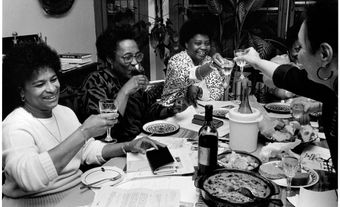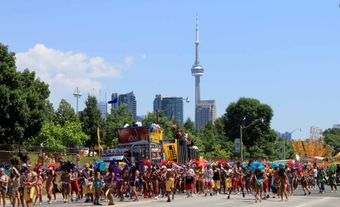Karl Lévêque, community activist, Jesuit priest, philosophy professor and karate teacher (born 10 January 1937 in Cap-Haïtien, Haiti; died 18 March 1986 in Montreal, Quebec). He was unquestionably one of the greatest Haitian community activists who ever lived in Montreal.
Education
Karl Lévêque completed primary and secondary school in Haiti, but did his postsecondary studies in theology and became a Jesuit priest in Quebec. He then left for France, where he studied philosophy and received his doctorate from the Université de Strasbourg in 1967. Returning to Quebec in the late 1960s, Lévêque took courses in political science at the Université de Montreal and the Université du Québec à Montréal.
Activism
After brief stints teaching philosophy at Collège Ahuntsic and Cégep Saint-Laurent (see CEGEP), Lévêque became involved in critical actions to fight social injustice and social inequality. (See Social Justice; Social Class.) In 1977, he joined L’Entraide missionnaire, an organization that sends priests, monks and nuns to work in poor countries. In 1983, along with other Jesuit priests, he founded the Centre justice et foi (CJf). These two organizations fight injustice in society around the world. Their activities are grounded in liberation theology, which holds that poverty is neither natural nor inevitable, but the result of a worldwide social problem.
Karl Lévêque became especially involved in three causes that were important to him. He opposed the Duvalier dictatorship, which was oppressing the people of Haiti. He fought the various forms of discrimination experienced by many members of the Haitian community in Montreal. And he played an active role as a citizen in debating various issues of Quebec society.
But Lévêque’s commitment went beyond Quebec and Haiti. In particular, the situation in Latin America was one of his constant concerns. (See Latin American Canadians.) He maintained close ties with churches in South America and took sides with Brazilian liberation theologian Leonardo Boff in his fight with the Vatican. Father Lévêque became increasingly aware of the difficult social conditions under which the people of Latin America were living, which reminded him of conditions in Haiti. In 1984, he participated in a meeting in Barcelona that called for churches in rich countries to show solidarity with churches in countries of the South to counter the rising tide of conservative theology that the Vatican was promoting at the time.
Community Activities
At home in Montreal, Father Lévêque became deeply involved in the community. As a priest, he celebrated masses, marriages, and baptisms. In the 1970s, he played an active role in meetings about Haitian immigrants in Canada (See Immigration to Canada) who were facing deportation. In 1972, along with former priests Paul Déjean and Joseph Augustin, he founded the BCCHM (bureau for the Haitian Christian community of Montreal). Together with the Maison d’Haïti, founded that same year, the BCCHM became the first Haitian community centre in Canada. It offered a variety of activities, such as Haitian folk dancing, sports and music. It also served as a venue for meetings, lectures on the situation in Haiti, and the community. Karl Lévêque played a prominent role in this institution.
He also became an ardent student of karate, earned his Third Degree Black Belt, became a karate teacher, and in 1975 helped to found the Fédération Yoseikan Karate-Do, now a highly regarded martial arts organization. He founded a dojo at the BCCHM, where he brought in great teachers of the martial arts, including Tenth Degree Black Belt Yoshinao Nanbu. Over the following eight years, Lévêque himself trained 10 black belts, including Ducarmel Cyrius, who later became one of first kick-boxing world champions from Quebec.
In 1977, Lévêque began hosting two broadcasts — one on Montreal radio station CIBL, the other on Montreal community television — that became very popular in the community. He used both shows as a platform to provide incisive analyses on various topics, including the political situation in Haiti (denouncing the brutal dictatorship of François Duvalier in no uncertain terms) and the harsh realities experienced by many members of the Haitian immigrant community, in particular taxi drivers who faced overt racism. (See Haitian Taxi Drivers' Struggle Against Racism in the 1970s and 1980s in Montreal.) He also defended many Haitian immigrants who were claiming political refugee status and facing deportation. (See also Canadian Refugee Policy; Irregular Immigration and Canada.)
In 1982 and 1983, the Duvalier dictatorship ramped up its oppression of civil society in Haiti.Many journalists were imprisoned, many others exiled. Social and human-rights organizations were banned. The number of Haitians fleeing the dictatorship began rising dramatically. Large numbers of Haitian “boat people” began landing on Florida beaches, receiving heavy coverage in the major media. The Haitian diaspora organized numerous activities to denounce the crimes of the Duvalier regime. Karl Lévêque and many other Haitian expatriates held meetings to decry the situation in Haiti. The BCCHM served as a venue for numerous events to show solidarity with the people of Haiti.
Final Years and Legacy
In February 1986, right after the fall of Duvalier’s dictatorship, Lévêque made plans to return to Haiti for good. After a brief trip there, he returned to Montreal to pack his bags. But before saying farewell to his adopted city, he underwent surgery for a benign tumour at the Royal Victoria Hospital. He died there of complications from the anaesthesia on 18 March 1986. The news of his death hit Montreal’s Haitian community like a shock wave. Thousands attended his funeral. (See also Funeral Practices in Canada.)
Karl Lévêque is one of the most eminent Haitians to have lived in Montreal in the 1960s and 1970s. His political, theological and social leadership marked the history of the city’s Haitian community over those years.
In 1989, the Institut culturel Karl Lévêque was founded in Haiti. This private, not-for-profit organization is dedicated to popular education and analysis regarding Haitian politics.

 Share on Facebook
Share on Facebook Share on X
Share on X Share by Email
Share by Email Share on Google Classroom
Share on Google Classroom


